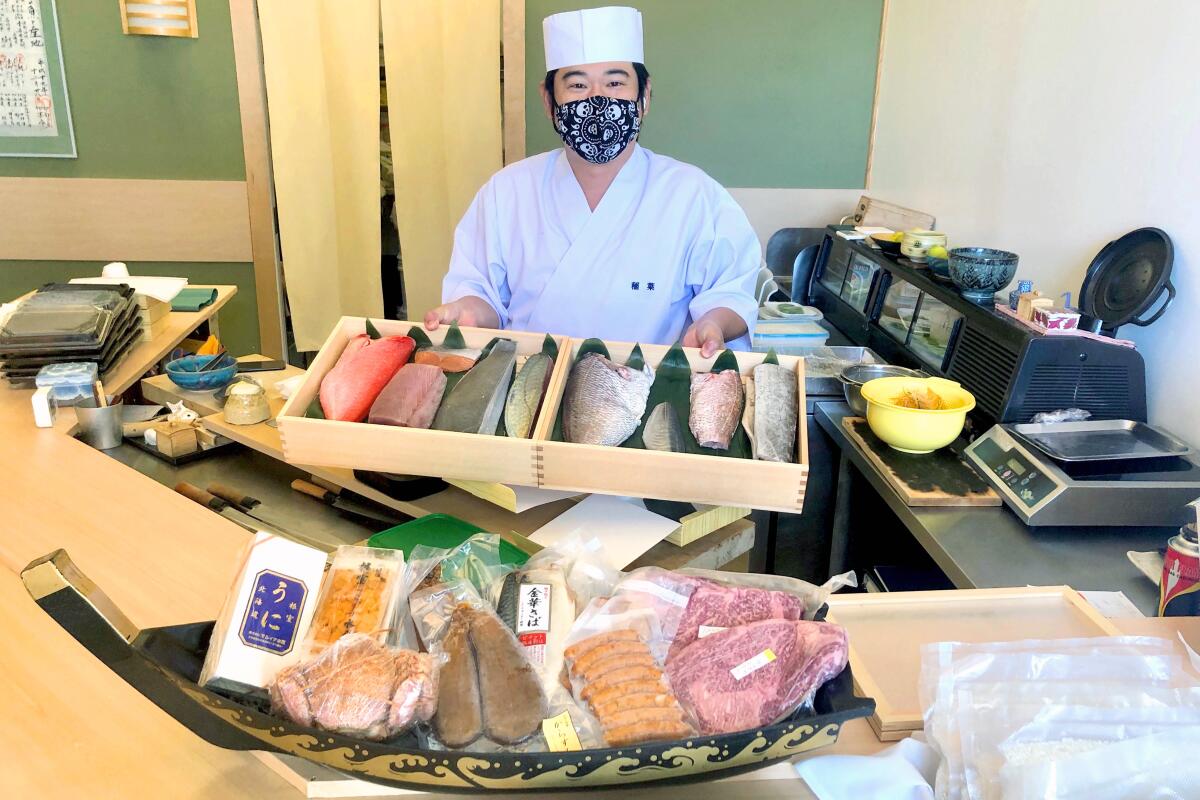Surviving the Shutdown: Wagyu and uni help keep the lights on at Sushi I-Naba

- Share via
The ongoing COVID-19 pandemic and ensuing shutdown has left many restaurants uncertain about their future. As smaller, less-heralded restaurants across the city grapple with new realities, we asked them to share their stories.
At his six-seat sushi restaurant in Manhattan Beach, Yasuhiro Hirano — clad in gloves and a cloth face mask — unveiled two wooden boxes filled with cuts of glistening fish: golden-eye snapper, yellowtail, shima aji, belt fish and horse mackerel.
It had flown in from Tokyo earlier in the week; since then Hirano had been aging the fish to deepen its flavor, one of many traditional techniques the 39-year-old chef uses to prepare exquisite sushi dinners that can cost $220 per person.
But there would be no omakase at Sushi I-Naba today — instead, Hirano has turned his restaurant into an ad hoc luxury grocery called “Mini Toyosu Fish Market,” in homage to the wholesale seafood market in Tokyo where his mother operates a distribution company.
Through her and other suppliers, Hirano now stocks seafood and other Japanese products to sell each week: A-5 Wagyu from Kagoshima (a.k.a. extremely fancy steak) for $95 per pound and trays of plump Hokkaido uni for $55; a dozen Japanese eggs is $6, bags of Koshikari rice for $4. Wagyu and uni have been his bestsellers so far, but he’s seeing more orders for whole fish as his regulars attempt sashimi at home.
“I offer to cut the fish into slices, but some want to do it themselves,” he said. “Afterward they send me pictures and ask how they did.”
Next week, for customers who order in advance, he plans to offer special sashimi boxes for $75, mosaics of that week’s fish. Hirano said he makes almost no money from the boxes, but he enjoys preparing them because his customers appreciate them and it gives him something to do.
His biggest concern is that international fish shipments, already slowed to a trickle, might soon stop altogether as Japan’s COVID-19 situation worsens and the country braces for a lockdown.
“There used to be many flights out of Toyosu each day, now there are only a few,” he said. “It’s become very serious in Japan, just like everywhere else.”
1300 Highland Ave., Ste. 107, Manhattan Beach; (310) 545-3345, sushi-inaba.com
More to Read
Eat your way across L.A.
Get our weekly Tasting Notes newsletter for reviews, news and more.
You may occasionally receive promotional content from the Los Angeles Times.










